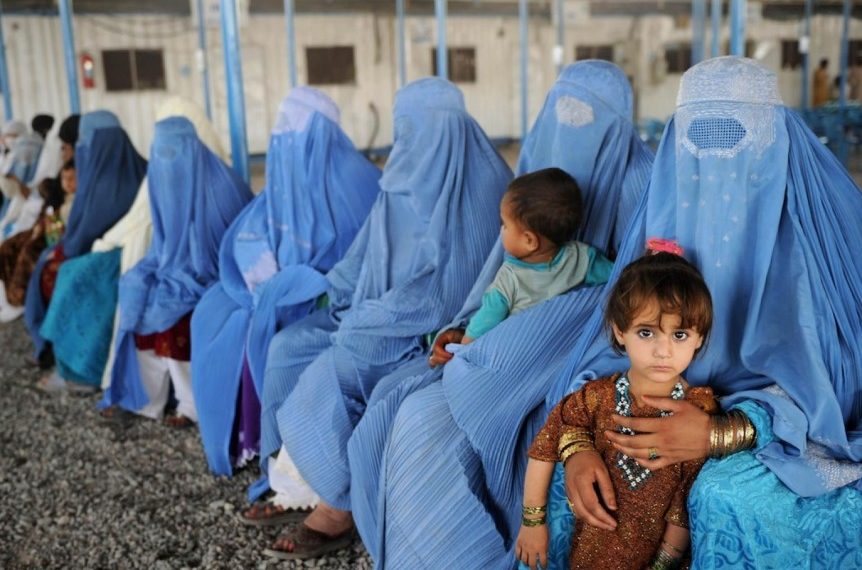The Taliban, a movement and organization known for their oppression of women and minorities, came to the negotiating table with the United States and Afghan representatives last week, along with 10 women from differing backgrounds, raising the question of whether or not they have transitioned into a new era of relative progressiveness.
The historic intra-Afghan peace talks took place in Doha and could potentially lead to the end of an 18-year war that has ravaged the region. Asila Wardack, the director-general of the United Nations Department of the Afghan Ministry of Foreign Affairs, was present at the latest conference between the groups in Doha and revealed that the Taliban who were present at the talks have vastly changed in the last few decades.
“One thing that we know is that the Taliban are not those Taliban that they were 20 or 18 years before,” Wardack said via Skype at an event on ensuring the Afghan peace process is inclusive at Georgetown University on July 11.
She went on to say that the Taliban who attended the talks are not the rough fighters many think of, rather they resembled politicians you would see in a more traditional government. Wardack recounted how at one point a Taliban representative even joked that the group of Afghani women representatives were “dangerous women” and asked them not to give the Taliban a hard time.
“My findings – maybe I’m wrong – but their attitude has totally changed towards women, towards government employees,” she said.
She also described how the atmosphere at the most recent talks was different to earlier talks in Moscow, where only one woman was present. Among the group of 10 women in attendance in Doha, there were four Tajiks, three Hazaras, one Pashtun and one Uzbek. Wardack said the women were treated respectfully by all parties involved.
“Everybody had the chance to speak and the environment was very good,” Wardack said. “It was such an opportunity for the Afghan women to present and for them to get the chance to directly talk with the Taliban.”
Hard to believe the Taliban's vows to protect women's rights when they are attacking the Afghan women who are exercising their rights. https://t.co/LUyVhCXbos pic.twitter.com/Z92UXidJK0
— Kenneth Roth (@KenRoth) July 14, 2019
This is a shift from the Taliban who ruled Afghanistan from 1996 until 2001, when the U.S. invaded and ousted them from power. During this time the group drafted a constitution which declared that the country be governed by Sharia law and that the Hanafi school of Sunni Islam was the official religion, with little mention of minorities such as the shi’i sect. The constitution dictated that “women’s education, within the limits of Islamic Shariah, will be arranged through a special law,” yet in practice schooling for girls was extremely rare.
“We have experienced living under the Taliban, we know what it means. For freedom of speech, we know what living under Taliban means, for women’s rights, or for example a demorcatic regime,” said Ghizaal Haress, an assistant professor of law at The American University of Afghanistan, at the Georgetown University event. “If you look at that constitution it is terrifying.”
The polished Taliban attending the talks last week have shifted their position from their original constitution to appear as a nationalist movement fighting for Afghanistan’s sovereignty, rather than a group who are only capable of punishment, said Robert Crews, a professor at Stanford University.
“Since the U.S.-led intervention destroyed the Taliban government and dispersed its leaders, the Taliban have proved quite adaptive in numerous ways. They skillfully launched a formidable and flexible counterinsurgency movement,” he said to The Globe Post. “At the same time, they worked to recalibrate their image to appear more as a nationalist movement devoted to defending the national sovereignty and independence of Afghanistan.”
However, there is a disconnect between what Taliban leaders are saying and those on the ground who are still carrying out terror attacks across the country and not discriminating when it comes to their victims. Earlier this month the group carried out a series of attacks in Kabul which killed around 40 people, including children. And on Saturday they killed another six people, including four police officers and two civilians, at a hotel in northwestern Afghanistan.
Following the seventh round of intra-Afghan peace talks, the Taliban and Afghan representatives released an eight-point plan to achieve lasting peace. The sixth point in the plan states “assuring women’s rights in political, social, economic, educational, cultural affairs as per within the Islamic framework of Islamic values.” Although this may sound like they are taking women’s rights into account during the peace talks, the vague language and exclusion of a definition of “Islamic framework” leaves many Afghan women worried about their rights if the peace declaration is put in place, said Wania Yad, an Afghan fulbright scholar at New York University, at the event at Georgetown University.
In recent years Afghan women have made considerable progress towards equality. In 2001, less than 900,000 children were in school with almost none of them female. Today, nine million children are enrolled in school, with 3.5 million of them being girls. Additionally, 100,000 women are currently studying at private and public universities in the country, according to Alice Wells, the acting assistant secretary of state for Central and South Asian Affairs.
U.S. diplomats are speaking with the Taliban about a peace deal. The hard-won rights women in the country have gained over the last 18 years are at risk. We went to Afghanistan to ask women what they are thinking. https://t.co/y0c5njB1y9 pic.twitter.com/e1NfcCMqEe
— The New York Times (@nytimes) July 14, 2019
Although the Taliban seemingly has loosened the reins on girls attending school, Crews said in reality their attitude towards female education isn’t so straightforward.
“They have acknowledged a limited right to education for girls, but, in practice, their approach to girl’s schooling has been mixed. The latest wording of an agreement signed at the Qatar talks is quite limited and vague, suggesting that the Taliban are not willing to concede very much on women’s rights,” he said.
Wardack also questioned the Taliban’s commitment to women’s rights despite their friendly meeting in Qatar. She said that she is unable to definitively say that the Taliban’s behavior has changed because on the first day of the intra-Afghan conference in Doha, there was an attack that wounded 100 school children in eastern Afghanistan. This contradicted their claims that they wanted to “minimize their civilian casualties to zero,” and their new stance of endorsing education and human rights.
Crews believes the attacks are an attempt by the Taliban to maximize their bargaining potential. However, he sees this backfiring as talks progress because civilians will lose trust in the groups participating in the talks.
“In reality, this violence is stiffening resistance to a peace settlement, undermining trust in the Taliban, in the Kabul government that is incapable of providing security, and in the U.S, who many fear seek a quick exit without a fair peace agreement that will preserve key elements of the post-2001 political system,” he said.
The claims that the Taliban have started to accept modern interpretations of human rights can also be accredited to the group adapting their language, rather than their actions, said Crews.
“Taliban leaders also learned from the technocratic language of the various NGOs [non-governmental organizations] and international organizations that promised reconstruction of an Afghan government that would provide Afghan citizens with security and services,” he said.
As peace talks continue, Yad said it is imperative that the Taliban back up their claims of support for human rights by guaranteeing they will not be infringed upon if a peace treaty is signed.
“We are pleased with the sound of peace, we are happy that the bloodshed will stop eventually,” she said. “But we are not going to compromise our freedom and our liberties that we have achieved so far.”
Talking with Just the Taliban Won’t Lead to Viable Peace in Afghanistan





















